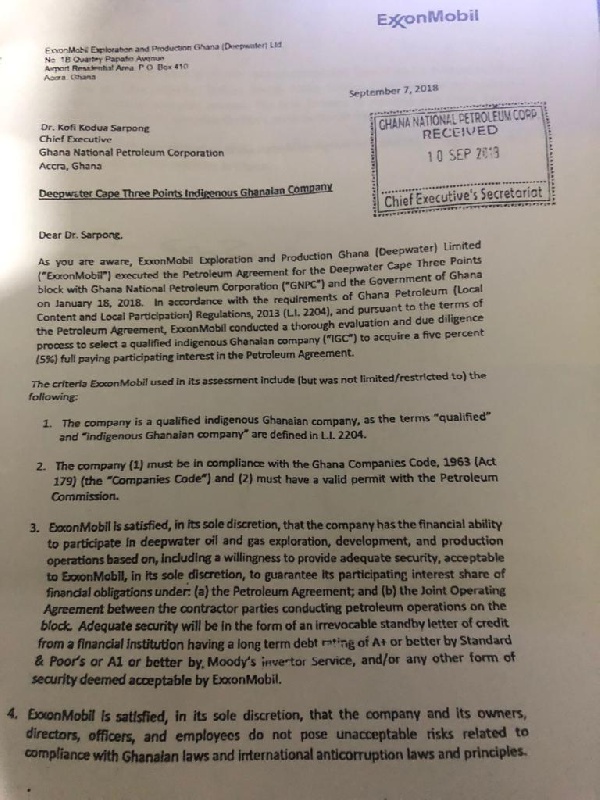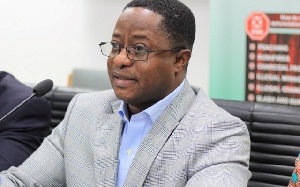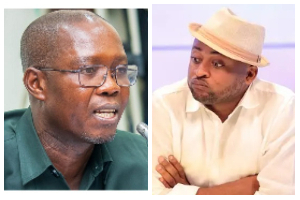Ghanaian Oil Company Griffon energy wants the ministry of energy and international Oil firm ExxonMobil to come clean on how they replaced them with Ghana Oil offshore limited as its preferred indigenous company partner for the Deepwater Cape Three Points oil Block.
Ghana Oil offshore limited a wholly owned subsidiary of GOIL on Wednesday, November 28, 2018, signed a Joint Operating Agreement with the multinational oil exploration firm ExxonMobil for Deep-water Cape Three Points Area Oil exploration.
The signing of the agreement comes after ExxonMobil said it had obtained a no-objection approval from the Ghana Government represented by the Ministry of Energy.
But a board member of Griffon Energy Africa Dr Kwame Owusu is disputing the claim that GOIL’s subsidiary company Ghana Oil Offshore limited was the preferred partner of ExxonMobil.
He insists that ExxonMobil wrote to the Ghana National Petroleum Corporation GNPC and the government of Ghana to first indicate it had selected Griffon Energy as its local partner.
In a letter to the media Dr Kwame Owusu a board of Griffon energy stated that “As a member of the board of directors of Griffon Energy Africa Limited, I was elated to be informed on September 8, 2018, that out of the 27 aspirant partner companies, Griffon had been selected by ExxonMobil as its preferred indigenous Ghanaian company partner for the Deepwater Cape Three Points Block.”
His joy was however short-lived as he “read in the Ghanaian press that GOIL has instead been selected as the preferred partner.’’
He insists he was puzzled by the decision especially when as an interested and selected party they were not informed about the change in decision demanding a probe “When and for what reason or reasons was Griffon deselected and GOIL, which was in the unselected group of 26 companies, selected to become the preferred company?”.
Dr Kwame Owusu who is also a Geophysicist is therefore also demanding the government of Ghana and ExxonMobil come out with the exact reasons why they made the change in the interest of transparency and fairness.
‘It will be prudent for both ExxonMobil and the government of Ghana to be very transparent and explain to both Griffon and the Ghanaian public how the decision was made. One would expect utmost transparency and fairness by a global company that should be expected to uphold the tenets of the Foreign Corrupt Practices Act of the United States of America’.


Further investigations reveal that after Griffon was selected in on September 8, 2018. The minister of energy wrote to ExxonMobil to demand reasons for the decision. In its response dated September 22, 2018, ExxonMobil stated only Griffon met their rigorous recruitment process.
It is believed the ministry under the direct instruction from the Presidency compelled ExxonMobil to drop Griffon for GOIL’s subsidiary under the guise of promoting local content notwithstanding the fact that Griffon Energy is also an indigenous Ghanaian company.
The other reason speculated for the selection of the GOIL subsidiary was because it was owned by the government of Ghana.
A claim which is not wholly true: this is because even though some state institutions like the Bulk Oil Storage Transportation company BOST are shareholders of GOIL, it is also true that Companies affiliated to some government officials like the Enterprise group and Data Bank are also significant shareholders.
ExxonMobil then on October 8, 2018, stated in a letter to the minister of energy presented both Griffon and GOIL as companies it was prepared to partner in the exploration. This was despite the fact that the same ExxonMobil had stated it was only Griffon that was qualified in its earlier communications with both the Ghana National Petroleum Cooperation GNPC and the ministry of energy.
Background
In 2013, Ghana passed a legislative instrument, the Petroleum Local Content and Local Participation Regulation, 2013, L.I. 2204 to provide legal backing to the Local Content and Local Participation Policy Framework that was designed in 2011.
This new law then opened the window for local companies to take part in the oil and gas or what we will call the petroleum upstream sector by ensuring that all petroleum agreement saw a joint venture which gave the 5% commercial interest.
An important part of the Local Content Policy is that it targets a minimum of 90 per cent local participation in all areas of the oil and gas value-chain by 2020.
Business News of Wednesday, 2 January 2019
Source: www.ghanaweb.com
Griffon questions ExxonMobil’s selection of Goil for Cape three oil block
Entertainment












